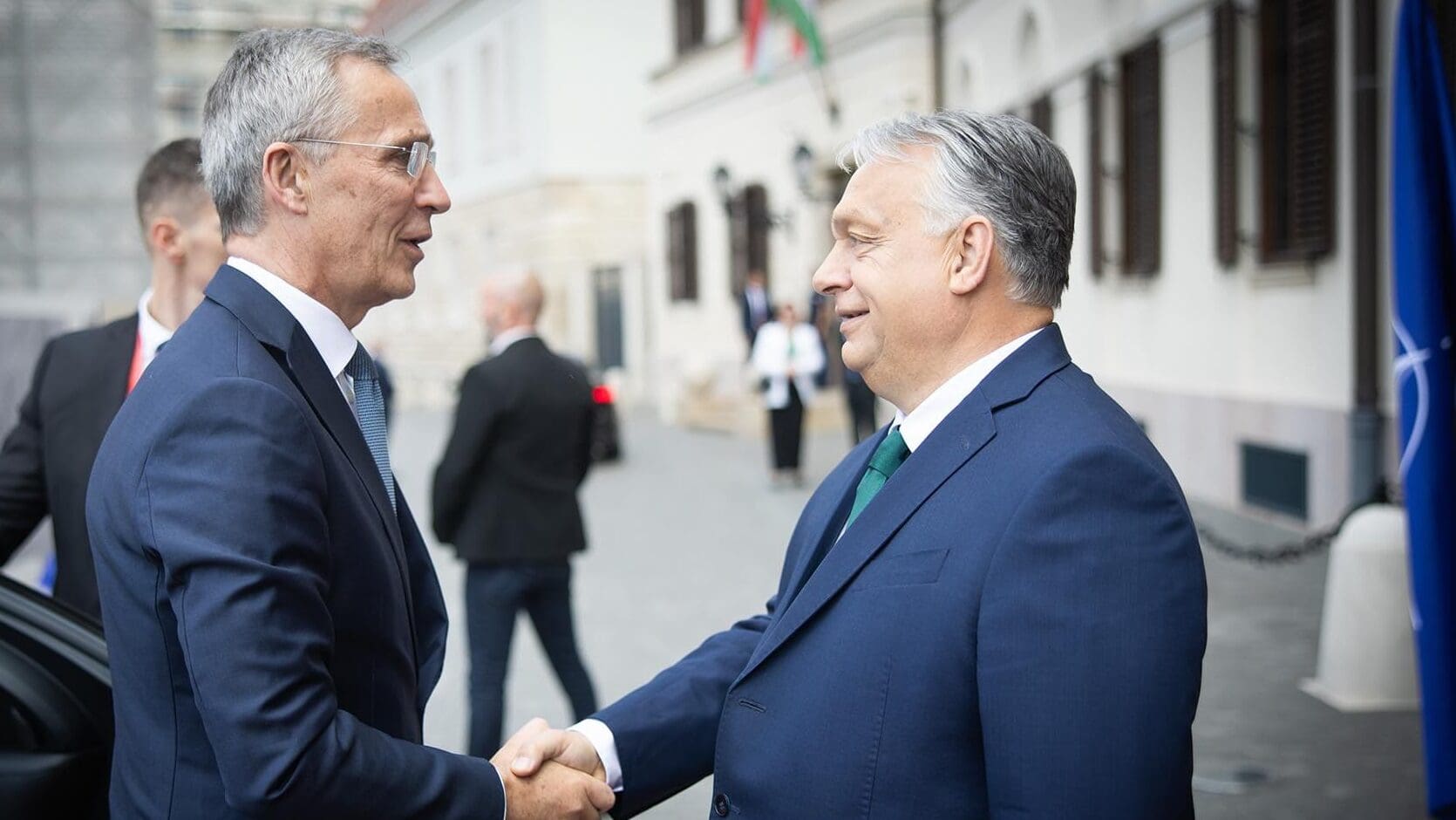
NATO chief Jens Stoltenberg and Hungarian PM Viktor Orbán
Photo: Viktor Orbán on Facebook, 12 June 2024
Hungary will not block majority-backed decisions in NATO but will not take part in any NATO-led mission in Ukraine either, Hungarian Prime Minister Viktor Orbán said on Wednesday, June 12th. This follows Orbán holding talks with the military alliance’s Secretary General Jens Stoltenberg in Budapest. The Hungarian decision also applies to security provisions and training Ukrainian troops.
Good meeting w/ @PM_ViktorOrban ahead of the #NATOSummit. In our meeting today we agreed modalities for Hungary’s non-participation in #NATO support for #Ukraine while enabling others to move forward. #Hungary continues to fulfill all its NATO commitments & remains a valued Ally. pic.twitter.com/27AhqSIx4g
— Jens Stoltenberg (@jensstoltenberg) June 12, 2024
Hungary has been one of a few NATO member states that have refused to send weapons to Ukraine in its fight against invading Russian forces. Viktor Orbán has criticised his Western allies for prolonging the war by giving Ukraine military aid when, instead, they should be looking for diplomatic solutions to bring about peace. The prime minister believes that the actions of these countries have escalated tensions, and will drag the whole of Europe into war with Russia.
In a recent interview with the daily Magyar Nemzet he said:
Let’s take a look at the position of the European powers two years ago and where we stand now. Earlier, Germany said that they were only sending helmets and categorically rejected the shipping of weapons. Today, German-made tanks are darting around in Ukraine and there is talk of transferring air defence systems. Discussions today are about whether German soldiers should enter Ukrainian territory within the NATO framework. This is how we have gone from helmets to direct confrontation.
When the decision was made for NATO to get behind Ukraine, “it was clear that the logic of war would require Europe to become increasingly more closely involved in the war,” he added. As Ukraine suffers military setbacks, depleted arms stocks, and is in dire need of new recruits, western countries have been calling for a more “direct” involvement in Ukraine, other than sending weapons. Both U.S. President Joe Biden and German Chancellor Olaf Scholz have bowed to pressure, announcing recently that they are allowing weapons they supplied to Ukraine to be used against targets inside Russian territory. Some NATO members are urging the alliance to move certain NATO operations to within Ukrainian territory—such as sending NATO military instructors to train Ukrainian soldiers. The plans arrive hot on the heels of French President Emmanuel Macron’s comments, who said that sending Western troops to Ukraine should not be ruled out.
Viktor Orbán said on Wednesday he had received guarantees from Jens Stoltenberg that participation in NATO operations taking place outside NATO territory will only be voluntary for member states. This means that “Hungary does not have to participate in the war.” The prime minister emphasised that Hungary is a loyal member of the alliance: it adheres to the NATO principle of spending at least 2% of its GDP on defence, 1,300 Hungarian soldiers take part in current NATO missions (such as the KFOR peacekeeping mission in Kosovo), and Hungarian fighter jets play their part in safeguarding the airspace of Slovakia, Slovenia, and the Baltic countries.
Though Hungary’s stance has differed from the majority of the member states of NATO since the start of the war in Ukraine, the country will not block any decision that has a clear majority, Orbán added.
The plans for NATO to take a leading role in coordinating and providing security assistance and training for Ukraine—as well as making a long-term financial pledge to provide military support—will be discussed at a NATO summit in Washington D.C. in July.
“Prime Minister Orbán has made it clear that Hungary will not participate in these NATO efforts and I accept this position,” Stoltenberg said on Wednesday.
It is likely that the agreement will resolve the issue surrounding Hungary’s membership of the Bucharest Nine (B9) group. According to a Financial Times article on Tuesday, the conservative government of Hungary has caused frustration within the group by blocking joint resolutions related to increased military aid to Ukraine, and was therefore on the verge of being ousted.
The B9 group facilitates intergovernmental cooperation between former Warsaw Pact members and post-Soviet states who all joined NATO after the dissolution of the Soviet Union—including the three Baltic states, the four Visegrad countries, as well as Romania and Bulgaria. It was created in 2015 at the joint initiative of Romania and Poland to address the security challenges from Russia after its annexation of Crimea in 2014.
The group’s latest meeting was held on Tuesday in Riga, and was not attended by Hungary’s President Tamás Sulyok, adding to the rumours that all was not well. “The Hungarian government always determines its foreign policy with the national interest in mind, which is also true for cooperation within various international formations,” foreign affairs spokesman Máté Paczolay told news website hvg.hu.
Hungary, however, was not the only member country that refused to endorse a joint declaration by the B9 countries on Tuesday. Bulgarian President Rumen Radev, who is also known for his anti-war rhetoric, said that the initial proposal for a joint statement—which included the obligation of each B9 country to provide military assistance—was changed at his insistence. As a result, a position was adopted that each country should decide for itself whether and how to help Ukraine.
A joint statement was only made by the presidents of Latvia, Romania and Poland, who co-hosted the Riga gathering. In it they say:
We remain as resolute as ever in supporting Ukraine for as long as it takes for Ukraine to prevail. We are committed to continue and enhance our broad support, including by military, financial or humanitarian means, to Ukrainians in their heroic defence of their nation, their territory, and our shared values.
